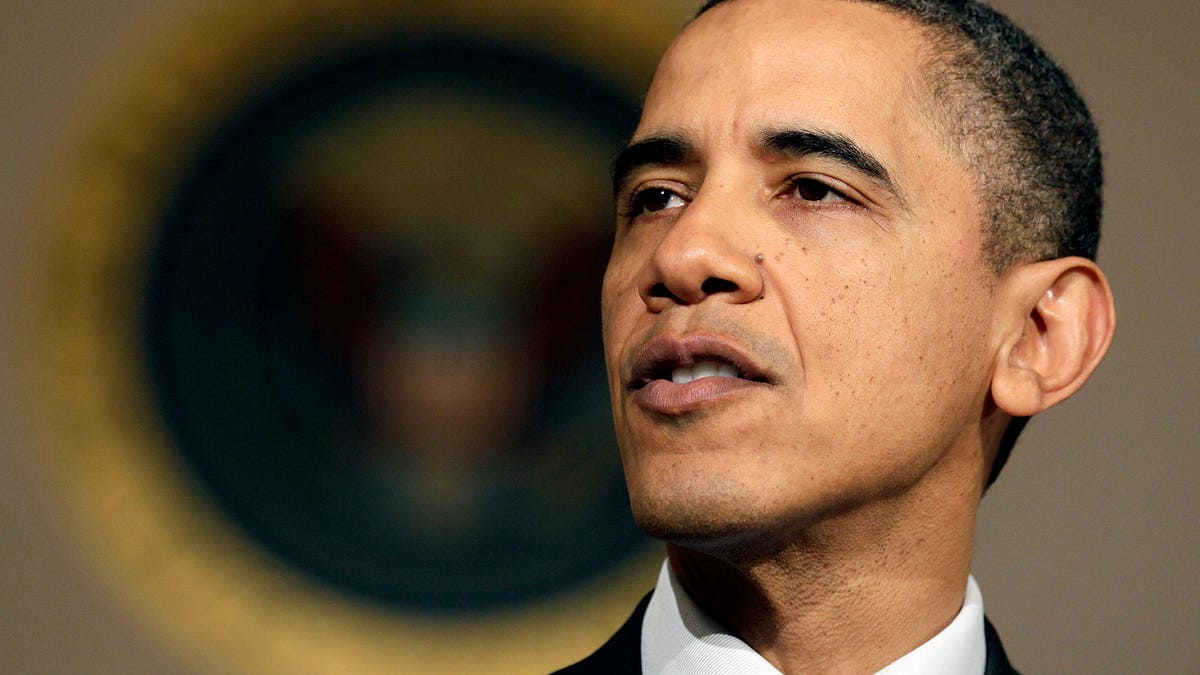
President Barack Obama makes a statement on the resignation of Egypt's President Hosni Mubarak in the Grand Foyer at the White House in Washington, Friday, Feb. 11, 2011. (AP) (AP2011)
Appealing to the "new generation" in Egypt, President Obama applauded the protesters who succeeded Friday in ousting Hosni Mubarak following days of demonstrations -- saying they have "inspired" Americans with their nonviolent activism and vowing that the two countries will remain partners.
Obama cautioned that there will be "difficult days ahead" but expressed confidence that the Egyptian people will achieve a true democracy "peacefully." As his administration has done for the past two weeks, he called for a "credible" transition that ensures free elections and protects the rights of Egyptians.
"The people of Egypt have spoken, their voices have been heard and Egypt will never be the same," Obama said.
Following days of uncertainty regarding Mubarak's plans, the president compared the outcome Friday to other seminal changes of the past century, including India's rise against the British and the fall of the Berlin Wall. Though Mubarak has been a key U.S. ally for decades, Obama did not mention Mubarak by name in his remarks. He cast the power shift as the manifestation of ordinary Egyptians' "boundless aspirations" for a better country and government.
"Egyptians have inspired us," he said. "For in Egypt, it was the moral force of nonviolence, not terrorism, not mindless killing ... that bent the arc of history toward justice once more."
Mubarak's resignation opened the door for Obama to make his most definitive statement to date about the nature of the protests. White House officials, while putting pressure on Mubarak, have hedged over the past two-and-a-half weeks. Mubarak had been expected to step down Thursday, but the White House was taken by surprise when he instead handed power to Vice President Omar Suleiman while vowing to stay in office through the fall elections.
Senior administration officials later said the White House and State Department were leaning on Suleiman to clear things up.
After Mubarak resigned, Obama said Friday that "the wheel of history turned at a blinding pace."
But concerns remain about what will fill the power vacuum. Though Suleiman and military leaders are expected to wield power in the interim, the possibility that a group like the Muslim Brotherhood -- outlawed under Mubarak -- could gain bona-fide political power and shift the country away from the West and Israel has some lawmakers nervous.
"That would worry us if the Muslim Brotherhood would hijack the electoral process to gain a foothold in the legitimate process ... and that would damage Egypt's relations with the U.S., with our strong ally Israel and would really put us in a difficult situation," said Rep. Ileana Ros-Lehtinen, R-Fla., chairwoman of the House Foreign Affairs Committee.
She said the United States and other allies can play a key role in helping to establish "free and fair" elections and ensure "responsible folks" run for office.
Obama did not mention the Brotherhood Friday but said the transition "must bring all of Egypt's voices to the table."
While some argue the influence of the Brotherhood is overstated, Democratic pollster Doug Schoen said that at least 60 percent of Egyptians support the organization and predicted that in a truly democratic election, those allied with the Islamist group would gain a majority and "probably the presidency."
Former CIA officer Michael Scheuer warned that what follows could be "a government much less friendly to the United States and much influenced by the Muslim Brotherhood."
The departure of Mubarak raises broader political and diplomatic questions -- about what role Egypt, the largest Arab country and the first to strike a peace agreement with Israel, will play in the region going forward; about whether other countries will try to expand their influence; and about where the turmoil leaves the United States.
Former Pentagon intelligence officer Mike Barrett said the shift certainly opens the door for Iran to be "further expansionary," and start meddling more in the region.
Obama said the United States "will continue to be a friend and partner to Egypt," but the administration's willingness to back away from the Mubarak regime has already stirred concern among other Arab leaders, particularly those in Saudi Arabia.
Dan Gillerman, former Israeli ambassador to the United Nations, said Israel remains the United States' "only ally" in the region now that Mubarak is out.
White House Press Secretary Robert Gibbs stressed Friday that the new Egyptian government must recognize its peace agreement with Israel.
Despite the uncertainty, the White House and congressional lawmakers expressed hope Friday that a peaceful transition would ensue and the United States would still have a foothold in the region.
"I hope this will lead to an orderly transition to a more orderly government," House Speaker John Boehner said.
"All nations must now support an orderly, peaceful transition to democracy. We hope the first steps of the new government will be to guarantee free and fair elections as soon as possible, while also keeping the peace with all of Egypt's neighbors including Israel," Sen. Bill Nelson, D-Fla., said in a written statement.












































